 Director, Middle East Nonproliferation Program
Director, Middle East Nonproliferation Program
[email protected]
Washington DC
202.601.2330
Activities
Dr. Chen Zak Kane focuses on projects related to reducing the proliferation of weapons of mass destruction and terrorism, with a particular focus on the Middle East. In addition, she examines means to strengthen the International Atomic Energy Agency’s safeguards system and the projected expansion of nuclear energy in the Middle East. Dr. Kane also serves as a Project Lead of the Middle East Weapons of Mass Destruction Free Zone Project at the United Nations Institute for Disarmament Research. Dr Kane is the founder of the Middle East Next Generation Arms Control Network (http://www.menacs.org/). She has held research positions at the Belfer Center for Science and International Affairs at Harvard University, as well as the Washington Institute for Near East Policy. Dr Kane was an adviser to both the Jebsen Center for Counter-Terrorism at Tufts University, the Crown Center for Middle East Studies at Brandeis University, as well as an adjunct professor with the National Defense University. Prior to joining CNS, she worked at the Center for Strategic and International Studies (CSIS). She holds a PhD and MALD from Tufts University’s Fletcher School of Law and Diplomacy and MA and BA from Tel Aviv University.
Areas of Research
- Disarmament and Verification
- Export Controls
- International Treaties & Regimes
- Iran
- Iraq
- Middle East
- Nuclear energy in the Middle East
- Nuclear-Weapon-Free Zones
- Proliferation of WMD in the ME
- WMD Free Zone in the Middle East
Education
- B.A. in sociology, anthropology, and political science from Tel Aviv University
- M.A. in security studies from Tel Aviv University
- M.A.L.D. and a Ph.D. from Tufts University’s Fletcher School of Law and Diplomacy
CNS Work
- Putin’s War with Ukraine: Voices of CNS Experts on the Russian Invasion
 A compendium of CNS expert analysis and commentary on the nuclear ramifications of the war, as well as educational materials for expert and general audience.
A compendium of CNS expert analysis and commentary on the nuclear ramifications of the war, as well as educational materials for expert and general audience. - An Oral History of the Arms Control and Regional Security (ACRS) Working Group
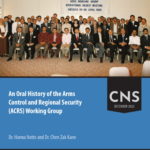 The report contains a comprehensive account of the ACRS Working Group meetings during the 1990s.
The report contains a comprehensive account of the ACRS Working Group meetings during the 1990s. - Arms Control and Regional Security Oral History Project
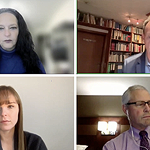 CNS experts conduct oral history interviews with participants in the ACRS multilateral meetings in the early 1990s, following the Madrid Conference of 1991.
CNS experts conduct oral history interviews with participants in the ACRS multilateral meetings in the early 1990s, following the Madrid Conference of 1991. - OP#56: Russian-Turkish Relations and Implications for U.S. Strategy and Operations
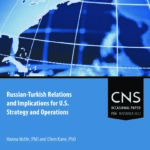 This study outlines an inventory of measures the U.S. government can take, comprising strategic and operational recommendations.
This study outlines an inventory of measures the U.S. government can take, comprising strategic and operational recommendations. - US-Black Sea Nonproliferation Professionals Exchange: US Module
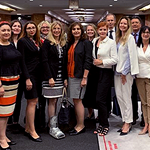 Participants from six countries fostered ties between US and Black Sea technical and policy communities with tours of both of the National Laboratories, nuclear science museums, and Washington DC.
Participants from six countries fostered ties between US and Black Sea technical and policy communities with tours of both of the National Laboratories, nuclear science museums, and Washington DC. - OP #54: Implications of Russia’s Activities in the Middle East and North Africa Region for U.S. Strategy and Interests
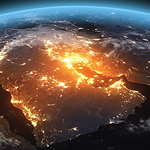 Russia’s ability to project power into the region remains limited today, and the status quo seems tolerable. But there are risks to U.S. interests in the future.
Russia’s ability to project power into the region remains limited today, and the status quo seems tolerable. But there are risks to U.S. interests in the future. - The Status of the Front End of Saudi Arabia’s Nuclear Fuel Cycle
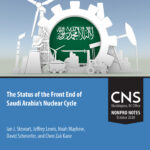 Reviewing the claims underlying recent media reports of KSA uranium mining and milling.
Reviewing the claims underlying recent media reports of KSA uranium mining and milling. - Coronavirus in the Middle East: A Rare Opportunity for Diplomacy?
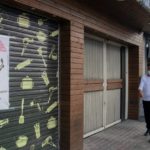 Ironically, the conflict and instability-plagued Middle East could turn the coronavirus crisis into an opportunity.
Ironically, the conflict and instability-plagued Middle East could turn the coronavirus crisis into an opportunity. - Biological Warfare and Pandemics in the Middle East
 WEBINAR: Dr. Chen Kane joins a virtual panel on the growing crisis in the region.
WEBINAR: Dr. Chen Kane joins a virtual panel on the growing crisis in the region. - Regional Security from the Ground Up
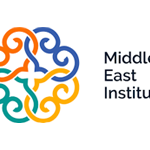 Three overlooked factors to get there are the deficits in strategic, legal, and technical know-how among most powers in the region.
Three overlooked factors to get there are the deficits in strategic, legal, and technical know-how among most powers in the region.
Bibliography
- Nuclear Decision-Making in Iran: A Rare Glimpse, Middle East Brief 5, May 2006.
- “The Middle East’s Interrupted Atomic Dreams,” Foreign Policy, Dec. 29, 2009.
- Nonproliferation Issues in U.S.-ROK Nuclear Cooperation, in U.S.-ROK Workshop on Nuclear Energy and Nonproliferation, the Henry L. Stimson Center and The Asia Foundation Center for U.S.-Korea Policy, January 20, 2010.
- Report of the Technical Advisory Group on Nuclear Energy in the Middle East, November 16, 2010.
- “Going Global: Issues Facing South Korea as an Emerging Nuclear Exporter,” Joint U.S.-Korea Academic Studies.
- “Time for Leadership: South Korea and Nuclear Nonproliferation,” Arms Control Today, March 2011.
- “From Donor to Partner: The Evolution of U.S. Cooperative Threat Reduction into Global Security Engagement” NTI Issue Brief, May 12, 2011.
- Scientific Engagement In The Middle East: Nonproliferation, Responsible Bioscience, and the Environment, Presentation at Global Green USA event, July 2011.
- “The role of civil society in promoting a WMDFZ in the Middle East” Disarmament Forum UNIDIR, issue 2, 2011.
